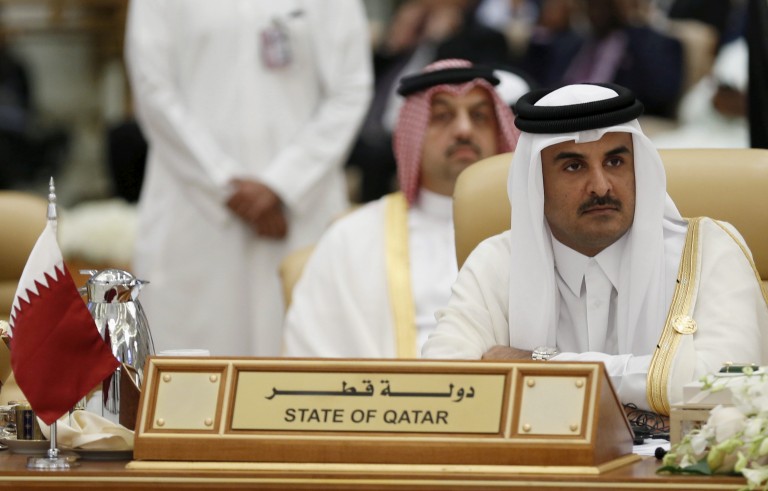(单词翻译:单击)
JUDY WOODRUFF: For more than 35 years, the so-called Gulf Cooperation Council, or GCC, has united the nations of Kuwait, Saudi Arabia, Bahrain, Qatar, the United Arab Emirates, and Oman, the goal, to put the wealthy, predominantly-Sunni nations of the Persian Gulf behind common cultural, political and military objectives.
But, overnight, long-simmering tensions between Qatar and several of its fellow members, and other regional states, burst into full-fledged diplomatic crisis. Saudi Arabia, Bahrain, the UAE and Egypt, among others, broke off diplomatic contact and suspended commercial ties with the Qatari government.
For more on these dramatic developments, I'm joined by Joyce Karam, the Washington bureau chief of Al-Hayat. It's an international Arabic daily newspaper.
Joyce, thank you very much for being with us.
Why did this happen?
JOYCE KARAM, Al-Hayat: Well, as you said, Judy, this is a very dramatic escalation.
We have been covering tense relations between Qatar and Saudi Arabia and the UAE for a while, but it hasn't ever gotten to the point where they're not only closing embassies. They're sealing off the border. They're blocking airspace and maritime access to Qatar.
Qatar, as you know, is a country smaller than the state of Connecticut. It's completely dependent for its food supplies, for — 40 percent of its food supplies come from Saudi Arabia. So, this is dramatic, unprecedented escalation.
It comes at a time where we are told that both the Saudis and the Emiratis have had enough. There is — almost every alignment in the region, there's two camps today, if you want to say. There's the pro-Islamist movement camps, where Qatar is now boxed in, and the more closer to this administration, the Saudi and the Emirati and the Egyptian camp, and this is where things are going from here.
JUDY WOODRUFF: So, among other things, we're hearing that these five countries are saying Qatar is too extremist, that it's been sponsoring terrorism. The Qataris are saying — say that's not true.
What's really going on?
JOYCE KARAM: Well, it's, again, this different alignment in the region post-Arab Spring of 2011.
Qatar is seen today as a host leaders from Hamas, from Taliban. Actually, just tonight, the Qatari emir will be hosting Sheik Kardari, who is well-known extremist in the region, for an iftar.
So …
JUDY WOODRUFF: That's an Islamic …
JOYCE KARAM: Islamic cleric.
So, in that sense, Qatar is seen as very closed, has boxed itself in with these Islamist movements. And this has been a problem with its relations with Egypt, with Saudi Arabia and with the Emiratis. And what we're seeing unfold is a clash, is a rift within the GCC on the direction forward, whether it's in counterterrorism or other.

JUDY WOODRUFF: But we know that some of these countries that are accusing Qatar have themselves at times supported some of the extremist opposition forces in Syria, for example.
So is it so clear that Qatar is doing something different from what these other countries have been doing?
JOYCE KARAM: It's — I think Syria is a very complicated battleground, but, if you look at Syria itself, the main group that is affiliated with al-Qaida, formerly known as Jabhat al-Nusra, is — it's supported by Qatar.
It's — the head of a group, Julani, gives interviews on Al-Jazeera. There was a Financial Times story today that Qatar might have indirectly paid a ransom of $1 billion that went to extremists on both sides in Syria.
So, this has become problematic within the GCC. And I think they do feel bolstered after the Trump visit to do more on that front.
JUDY WOODRUFF: The countries that have — because it's true that this has happened just a week or two after President Trump was there in Saudi Arabia.
But — so, let's quickly talk about — Joyce, about how this affects the region and relations with the U.S. going forward.
JOYCE KARAM: I mean, this is a very tense time in the region.
This is an almost Arab cold war happening within the Gulf Cooperation Council. I think the U.S. tried to distance itself today a bit. The Pentagon reiterated its defense relations with Qatar. Al Udeid Air Base continues to be active, that the counter-ISIS effort will not be impacted by this.
As we speak also, Judy, I think the Kuwaitis are trying to mediate, to find a common ground in the coming hours. The emir of Kuwait will be heading to Saudi Arabia tomorrow. If they can achieve a breakthrough, you know, given the list of demands that Saudi and the UAE have put together, that means maybe the citizens of Qatar will not be expelled from these countries.
JUDY WOODRUFF: Unfair to ask you this question and ask for a quick answer, but is there fear this could lead to all-out war?
JOYCE KARAM: I don't think any side at this point is interested in a military confrontation.
And I think Qatar, given that it's a small country, and most of Qatar's strategic depth is within the Gulf region, I don't think Qatar has an alternative but to fix this with its neighbors.
A Saudi official tells me that the only way this is — there would be an exit is if Qatar went away and, you know, forgot its old habits. So, we're looking — they're looking at a change of behavior from Qatar, not just demands, as it happened in 2014.
JUDY WOODRUFF: Joyce Karam, tough subject. Thank you very much, with Al-Hayat.
JOYCE KARAM: Thank you.
JUDY WOODRUFF: We appreciate it
JOYCE KARAM: Thank you so much.


